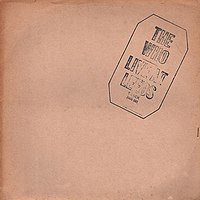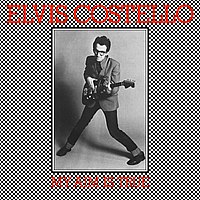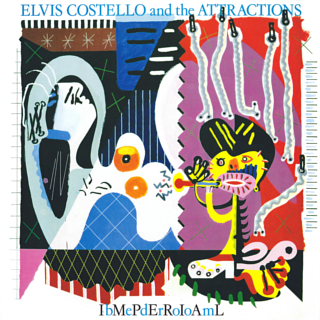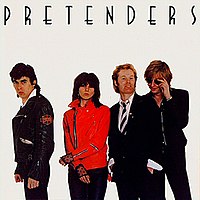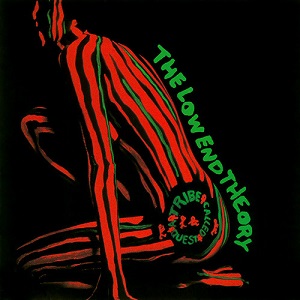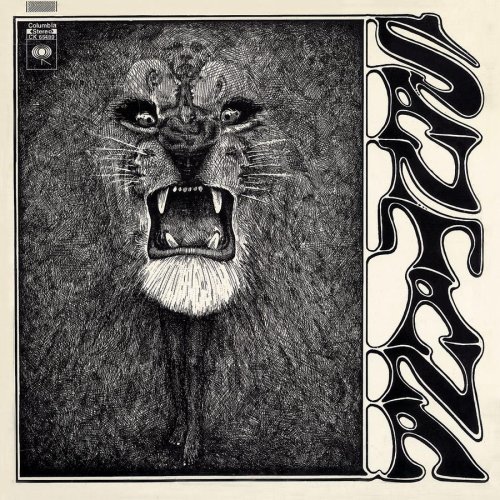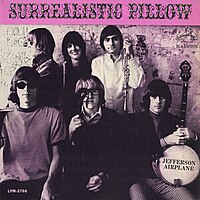 Band:
Band: The Flaming Lips
Album: The Soft Bulletin
Why Rolling Stone gets it right: No longer just an indie rock acid trip, the Flaming Lips put out a lush, heavily orchestrated album. Now a trio, the band doesn't wait to fuck around with kazoos or easy rhymes, but now simply created an atmospheric conception of reality on record that is basically perfect. The best album in a crowded field of 1999, "The Soft Bulletin" is beautiful.
Why Rolling Stone gets it wrong: This should, undoubtedly be on the list.
Best song: "Waitin' For A Superman" is likely the album's highlight, as it's the band's most introspective and conscious song. But, "Buggin'" is wonderfully fun, "The Spiderbite Song" has roots in the band's history and "The Spark That Bled" is almost operatic. And, of course, there's Wayne Coyne's beatboxing on "Feeling Yourself Disintegrate."
Worst song: This album is up there with the near-perfects.
Is it awesome?: Yes, yes. One thousand times yes.
I guess I could see a world where the Flaming Lips are considered middlebrow claptrap. They do straddle the line between being indie rock faves and AAA friends (mostly due to the music's use in commercials), but that line gets blurrier and blurrier by the day. I mean, who would've thought Explosions in the Sky would have a song in a Cadillac ad?
Still, The Lips have been doing this for a while. Their only real hit was a hit because of exposure on "Beavis And Butthead," despite it being the second-best song on that particular awesome album. Their oddball song subjects ("Christmas At The Zoo," "Guy Who Got a Headache and Accidentally Saves the World," etc.) and hook-laden if not catchy four-piece ease never really caught on with indie rockers who weren't into, well, psychotropic drugs.
This eventually led to "Zaireeka," and experiment in quadrophonic sound as well as the gullibility of fans (I bought a used copy and didn't enjoy it). It looked like the first step in a more out-there Lips, but, in reality, it was simply the shedding of the weirdo skin. "Zaireeka," as misguided as it was, was simply a step towards greatness.
---
"The Soft Bulletin" has been lauded as a concept album, but I can't seem to find the subject of the album, nor a plot, so I'm going to kick that idea out of here. Rather, it's the Flaming Lips finally addressing the world at large and reality on a record. Instead of the droning guitar and metronome beat of "Slow Nerve Action" (the best song from "Transmissions") or the kazoo and guitar riffing of "She Don't Use Jelly," the band's tenderness shows through to a comrade in "The Spiderbite Song." Ostensibly about a lie trying to cover up Steven Drozd's drug use (he said the festering wound on his arm was a spider bite, when it was due to IV drug use), "The Spiderbite" is just as well a tribute to a friend as "Shine On You Crazy Diamond" is, only a quarter of the length and much more fun. Following it comes "Buggin'," a song that could easily serve as a child's singalong as the Zombies-chamber-pop that it actually is. It's wonderfully constructed, based in piano, a heavily reverbed drum/bass combo and sweet strings.
---
The thing about the Flaming Lips is that they're a band you
root for. (Name-dropper alert) I think to the time I met Wayne Coyne and how incredibly nice the guy was. It was about a year after this record came out, three friends (hi, Tehft, Joc and Mark!) and I went to Lawrence to see Elliott Smith in Lawrence, KS (that was the closest he was playing to Columbia, MO, where we went to college). The Bottleneck is a fantastic club in Lawrence; Most of the important indie bands play there.
Anyway, like the idiot self-promoter that I was/am, I wore a KCOU (our school's radio station) t-shirt. The Flaming Lips had recently played in Columbia on the first "Soft Bulletin" tour -- it remains the best single show I've ever attended -- and Wayne came up to Mark and I after the show to talk about Columbia. He asked if we were from KCOU and we asked if he goes to a lot of shows in Lawrence. I'm paraphrasing, but he basically said that Lawrence is close enough to Oklahoma (where the Lips reside) that he'd make the trip for friends of his (he knew some people in Smith's band).
Remember, this is a time when "The Soft Bulletin" was being compared -- rightly, I want to say -- to "Pet Sounds" and "Dark Side Of The Moon." The band was on everyone's favorite list for about a year and a half. Their shows were becoming must-see events. And like the nice guy he was, Coyne was just chatting up a couple of guys who worked at a radio station he liked in a town 100 miles away. Like it was nothing.
Indie rock is a culture without much separation from the fans. There aren't a lot of douche bag indie rock superstars (Isaac Brock and Ryan Adams are the only ones I can think of. Oh, also Albini.); Most of them will chat you up. Most of the time, however, it's because they're in
your town playing a show for your station. But, for some reason, I expected Coyne to be shy or withdrawn. I certainly didn't expect him to come up to
us because we were wearing KCOU shirts. What a nice guy.
---
This is the reason bitch and moan about Pitchfork's reviews. The review starts out with a multi-paragraph explanation about the writer's work habits and his roommates. Things readers don't care about.
(Yes, I understand the irony in my complaining about masturbatory reviews.)
Still, one of the reasons I still love Pitchfork is this line: "One of the only albums I can compare it to is Dark Side of the Moon-- a sonic exploration into a bunch of morbid themes that sound extra good when you've been kissing Ol' Lady Bong." Absolutely true and as well-worded as you can expect. "The Soft Bulletin" is a "Dark Side" for aging and change.
---
"What Is The Light" is sparse and existential, as evidenced by the song's subtitle in the liner notes.
(An untested theory hypothesis suggesting that the chemical [in our brains] by which we are able to experience the sensation of being in love is the same chemical that caused the "Big Bang" that was the birth of the accelerating universe)
It's on this album that the band tackles the big questions. In "The Spiderbite Song," it's friendship and loyalty. On "What Is The Light?" it's the universe's depth and on "Suddenly, Everything Has Changed," it's the nature of getting older. "The Observer" is a cosmic-sounding instrumental -- not unlike Floyd's "The Great Gig In The Sky" -- that further brings up the question of existence.
---
Of course, part of my fondness for this record is likely based in when I saw the band perform at Columbia, MO's Blue Note in the spring of 2000. Unlike most bands who played at a venue the size of the Blue Note (not a big venue), the Lips put on a
show. In lieu of having a live drummer, horn section and orchestra, the band played to tape a lot, with Michael Ivins playing a bass and Steven Drozd moving between the guitar and keyboards.
Behind the band was a large projector screen used to, presumably, expand the audience's experience. Boy, did it. The example I always think about was the video of an open chest cavity during surgery, showing the blob that is a human heart beating. Fittingly, the loop was recorded (and played) so that the beat of the heart corresponded with the beat of a song (I don't remember which). Later, the band showed Drozd playing the drums on the screen as they played
the big drum sound of "Slow Nerve Action."One of the other highlights of showmanship occurred right before and during the band's one hit, "She Don't Use Jelly." Because it got some radio play on MTV, the Lips were booked on the
old Jon Stewart Show, and before they played the song in Columbia, they projected Stewart's introduction -- skipping it in a video effect -- before the wailing introduction to the song.
During the song, in the one beat to each part, as the song lifts, men (presumably) in bunny mascot suits flung confetti into the air. The bunnies were in the audience and made everybody happy.
And "The Soft Bulletin" songs were performed just as perfectly. Coyne brought out a punching nun puppet at one point, singing to it. He used fake blood capsules to accentuate the lyrics of
"The Spark That Bled." It was perfect.
It's nearly impossible to describe the glee that I felt after that show. I immediately went back to my dorm and explained to my girlfriend how happy I the show made me
---
"Waitin' For A Superman" is the pinnacle of the record. A quasi-religious (spiritual?) track, the song was largely inspired by the death of Coyne's father and how Coyne dealt with it.
Is it gettin' heavy?
Well I thought it was already as heavy
As can be
Is it overwhelming
To use a crane to crush a fly?
It's a good time for Superman
To lift the sun into the sky
Is Superman the actual hero that we've come to know? Is it God? Is it something within us that lets us grieve and deal with loss? Is it all those things?
It doesn't really matter. The rolling drums and piano march lift Coyne's pain-stricken voice as the song falls into the chorus. The "Pet Sounds"-type production is filled in with the guitar that backs Coyne's voice, as well. It's lush and achingly beautiful.
---
I don't know if it gets lost in the shuffle of 1999's music or not. "Keep It Like a Secret," "Black On Both Sides," "Blackout!," "The Soft Bulletin," "Summer Teeth" and "Come On Die Young" (all favorite records of mine) came out in 1999. Hopefully, "The Soft Bulletin" rises to the top. It's one of the best of all-time.
